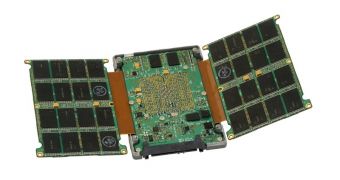It appears that SanDisk figured this was a good time for its collection of enterprise solid state drives to expand, so it presented six new 6 Gb SAS models based on either SLC or MLC NAND Flash memory.
Apparently, SanDisk finished its newest batch of enterprise solid state drives, which definitely don't resemble consumer ones much in shape or size, nor performance.
The newcomers are six in number and all communicate with whatever systems they end up in (servers, data centers, etc.) via the 6 Gbs SAS (6 gigabits per second Serial Attached SCSI) interface.
Three models use SLC (single-level cell) NAND Flash memory chips, leading to storage capacities of 100 GB, 200 GB and 400 GB.
Meanwhile, the other three, MLC (multi-level cell) based, obviously, feature 200 GB, 400 GB and 800 GB capacities.
All of them will be handled, marketing-wise, by SanDisk's Enterprise Storage Solutions ESS division, which came to be after the acquisition of Pliant Technology.
“With ever-increasing demands being placed on cloud and enterprise IT, our OEM partners require data storage solutions that don’t just keep up, but help their customers stay ahead,” said Greg Goelz, vice president and general manager, Enterprise Storage Solutions (ESS), SanDisk.
“Our new Lightning drives advance SanDisk’s industry-leading enterprise-class performance, reliability and endurance. Meeting HP’s stringent qualification requirements underscores our current leadership with EFDs as well as our commitment to continue to deliver breakthrough capabilities.”
The newcomers have fully independent, dual-port SAS interface and do not have write cache, meaning that they don't lose data during power interruptions.
Finally, they will have 2.5-inch or 3.5-inch from factors and will easily fit into existing SAS installations without needing modifications hardware layout or anything of the sort.
Sales of them should commence during the third quarter of the ongoing year (2011). Unfortunately, exact pricing details haven't been disclosed.

 14 DAY TRIAL //
14 DAY TRIAL //